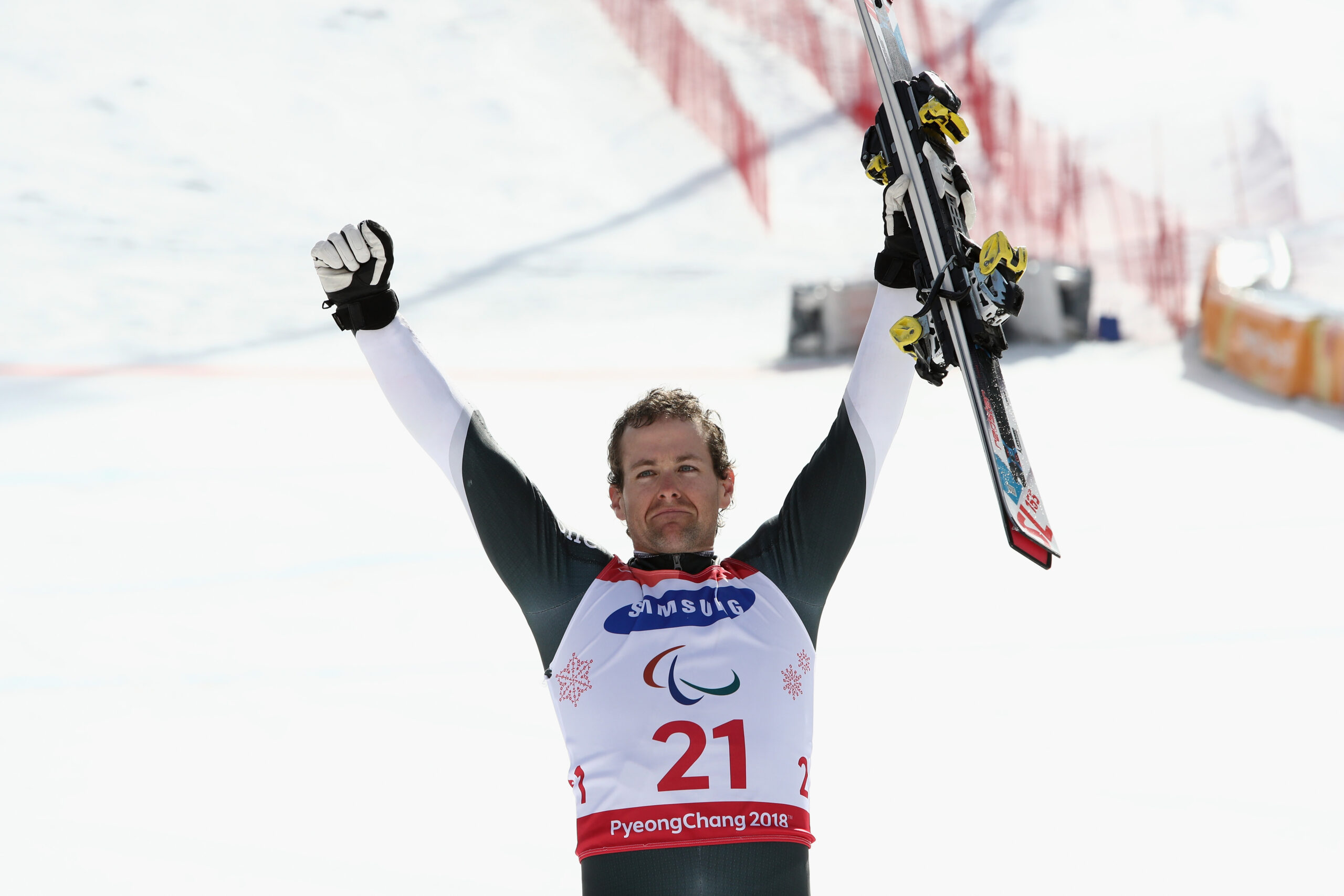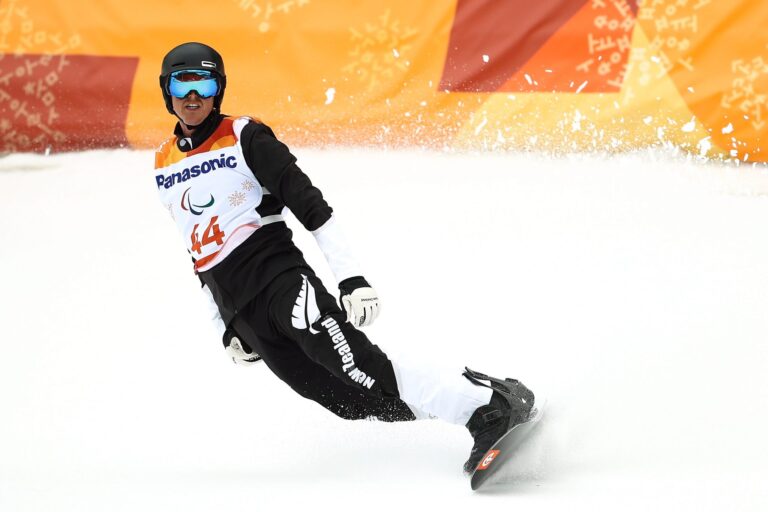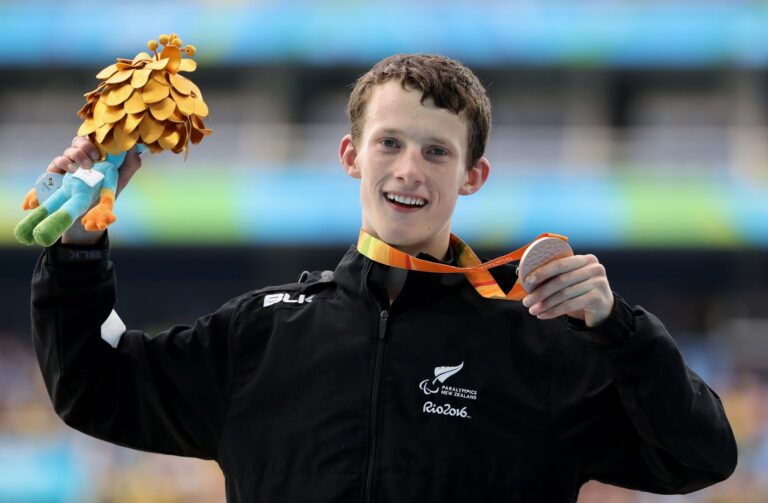The first Paralympic Winter Games (named the first Winter Olympic Games for the Disabled) were held in 1976 in Örnsköldsvik, Sweden, following the introduction of the summer Paralympic Games in Rome, 1960.
The 1976 Games were the first Paralympic Games (summer or winter) which featured athletes other than wheelchair athletes. New Zealand did not participate in the inaugural Winter Paralympics – our first involvement would come four years later in Geilo, Norway.
The Paralympic Winter Games are held every four years directly following the Olympic Winter Games. Since 1992, the Winter Paralympics are hosted by the city that hosted the Winter Olympics and use the same facilities.
How did the Winter Paralympics begin?
The origins of the Paralympic Winter Games are very similar to those of the summer Paralympics. Injured soldiers returning from World War II sought out sports as a way of healing and bonding with other injured soldiers.
In 1944, at the request of the British Government, Sir Ludwig Guttmann opened a spinal injuries centre at the Stoke Mandeville Hospital. Over time, the hospital grew into a rehabilitation centre where recreational and then competitive sport evolved.
The very first Paralympic Games held in Rome in 1960 featured 400 athletes from 23 countries. New Zealand was not one of the countries involved in the inaugural Paralympic Games – our first involvement would come eight years later in Israel.
Sepp Zwicknagl, a pioneer of snow sports for disabled athletes, was a double-leg amputee Austrian skier who experimented skiing using prosthetics. His work helped pioneer technological advances for people with disabilities who wished to participate in winter sports.
Whilst Zwicknagl’s work helped to progress winter sports for disabled athletes, advances were still much slower than summer sports and it was not until 1974 that the first official ski competition for physically impaired athletes was held. The first world championships were held in Grand Bornand in France, and featured Alpine (Downhill) and Nordic (Cross-Country) skiing for amputee and visually impaired athletes.
The first Paralympic Winter Games
At the first ever Paralympic Winter Games in Örnsköldsvik, Alpine and Nordic skiing for amputees and visually impaired athletes were the two main events, with ice sledge racing included as a demonstration event.
The success of the first Paralympic Winter Games led to the second Winter Paralympics in 1980 in Geilo, Norway where New Zealand entered its first Paraylmpic team at the Paralympic Winter Games.
New Zealand’s history at the Paralympic Winter Games
By the third Paralympic Winter Games in 1984, which were held at Innsbruck in Austria, the New Zealand Paralympic team was winning New Zealand’s first medals in an international skiing competition. (An Olympic medal in winter sports wouldn’t be won by a New Zealander until 1992.)
The team collected their first gold at the 1984 Paralympic Winter Games as well as three silvers and one bronze, representing one of the team’s most successful Winter Paralympics.
Between 1994 and 2002, New Zealand had a stellar run of Winter Paralympics, collecting six medals at each of the three Games held in that period. At Lillehammer in Norway in 1994, the team collected three gold medals and one bronze, in Nagano in Japan in 1998, the team went one better, picking up four gold medals, one silver and one bronze and in 2002 in Salt Lake City in the USA, the team once again collected four gold medals along with two bronze medals.
Last time out in PyeongChang in South Korea in 2018, Para alpine skier Adam Hall picked up a gold medal and a bronze medal, and fellow skier Corey Peters picked up a bronze, giving New Zealand a total haul of three medals. That meant we placed sixth in the world for medals per capita out of 49 competing countries.
New Zealand’s most successful Winter Paralympians
Team New Zealand has won a total of 31 medals at the Paralympic Winter Games including 16 gold medals, six silver and nine bronze.
Viv Gapes (nee Martin) is New Zealand’s first ever Paralympic Winter Games gold medallist. As a Para alpine skier she won a gold and 2 silver medals at the Innsbruck 1984 Paralympic Winter Games. The New Zealand Paralympic Team that competed at Innsbruck remains one of the largest winter Teams to date.
Mathew Butson is New Zealand’s most prolific medalist at a single Paralympic Winter Games. After making his debut at the 1994 Games in Lillehammer, Matt competed in his second and final Winter Paralympics four years later in Nagano where he won three gold medals in Men’s Giant Slalom LW9, Men’s Slalom LW9 and Men’s Super-G LW9, rounding out his haul with a silver in Men’s Downhill LW1.
Patrick Cooper is New Zealand’s most decorated winter Paralympian and on his Paralympic debut in Innsbruck 1988 he emerged as part of a new generation of Kiwi Para alpine skiers. Patrick won 6 medals across 3 Paralympic Winter Games, including a silver at Innsbruck 1988 and two spectacular gold medals at Albertville 1992. This was a feat he was to repeat at Lillehammer 1994 two years on, when he defended his 2 gold medals and picked up a bronze.
Winter Paralympic Games – Beijing 2022
The Beijing 2022 Paralympic Games will be held from 4–13 March 2022 and will feature a maximum of 748 Para athletes and up to 82 medal events – two more than PyeongChang 2018. This could potentially make the Beijing Winter Paralympics the biggest Winter Paralympics to date.
Two-time Paralympic gold medallist Adam Hall is one of a New Zealand team of three athletes selected for the Beijing 2022 Winter Paralympics.

Hall and fellow Para alpine skiers Corey Peters and Aaron Ewen will all compete at the Beijing Paralympic Winter Games, hoping to add to the three medals the team won last time out at PyeongChang.
Hall competes across a number of standing Para alpine ski events, in the classification LW1. This sport class is allocated to athletes with an impairment that strongly affects both legs. Athletes may have a double above knee amputation, one above knee and one below knee amputation or significant muscle weakness in both legs. These skiers use two skis and two poles/outriggers; they may have their skis tied together. Beijing 2022 will be his fifth consecutive Paralympic Winter Games. He has previously won gold at Vancouver in 2010 and at the last Winter Paralympics in PyeongChang where he claimed a gold and a bronze.






























